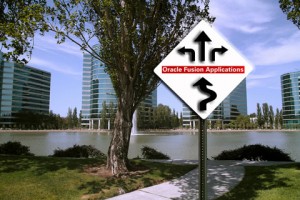
Oracle is hitting back hard at a recently released Forrester Research report that suggested most customers aren’t interested in moving up to the vendor’s next-generation Fusion Applications, which were released about 18 months ago following a long and expensive development process.
Forrester’s report made a case that Oracle faces a “strategic dilemma” when trying to push Fusion Applications, since it still makes a great deal of money from its older product lines. It also called the number of Fusion customers so far, which Oracle has placed at around 400, a “drop in the ocean” compared to its overall applications installed base.
Oracle’s pages-long response to the report contains a series of criticisms. For one thing, the report “is a speculative note based on misconceptions and wrong hypotheses,” Oracle said. “Readers will notice the repetitive use of ‘we believe,’ ‘our theory,’ ‘we think,’ and ‘we don’t know for sure.’”
Forrester also incorrectly gave the impression that “customers have a choice to make between Oracle Applications Unlimited and Oracle Fusion Applications,” Oracle added. “This is a wrong hypothesis from the start that conditions the rest of the note.”
Oracle has taken a “co-existence” approach to pushing Fusion Applications, wherein an installed base customer would use some Fusion modules alongside their existing E-Business Suite or PeopleSoft implementation. While Forrester mentioned the co-existence concept in its report, in Oracle’s view the research firm gave it short shrift.
“Customers can adopt modules of Oracle Fusion Applications incrementally and at their own pace to co-exist with their existing deployments. Never have we forced existing customers to move/migrate out of Oracle Applications Unlimited to adopt Oracle Fusion Applications,” the response states.
“Customers may not know what to do in the context of their specific implementation as each deployment is more or less specific, but Oracle’s strategy is very clear. We do not have a dilemma.”
Forrester also failed to adequately acknowledge the investments Oracle is making in its Applications Unlimited products, which include planned future releases and “long lists of enhancements,” according to the response.
In addition, Oracle criticised the underlying data of Forrester’s report, which included responses from 139 of the research firm’s clients who identified themselves as Oracle application users. That data comes from a survey conducted in June 2012, “so it doesn’t necessarily represent current market conditions,” Oracle said.
The data also didn’t have enough geographic or demographic variety, and “many questions” on the survey “were framed in a negative way,” according to Oracle.
“We stand by the report,” Forrester spokesman Phil LeClare said in a brief statement.
Oracle’s response to Forrester is a highly unusual move, given that its public relations arm typically offers little comment in response to outside criticisms. This could suggest Oracle is particularly sensitive to how Fusion Applications are viewed in the market.
Overall, Oracle is indeed facing a bit of a dilemma with Fusion, according to one industry observer not connected with the Forrester dispute.
“In a sense, Oracle’s Applications Unlimited policy has been too successful,” said analyst Frank Scavo, President of IT consulting firm Strativa. “The majority of Oracle’s existing customers are so satisfied with their current systems that they do not see a driving need to upgrade to Fusion.”
Moreover, “enterprise applications are quite sticky,” Scavo said. “It is hard enough for vendors to get customers to upgrade, even when vendors announce end of support for an existing product. Imagine how hard it is to get customers to move when you are promising them continued investment in those existing products.”





